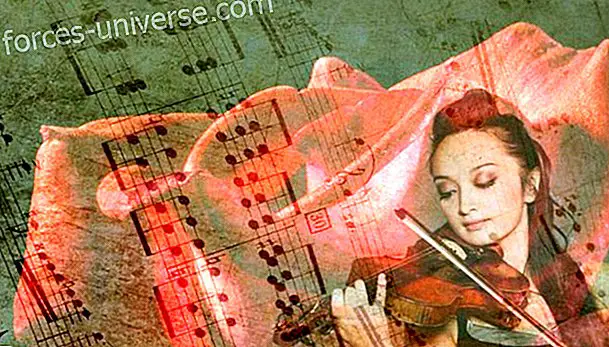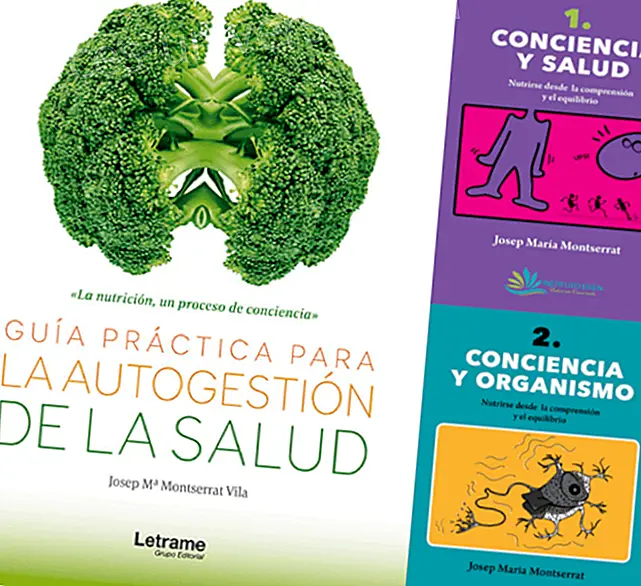The spiritual essence of music: Introduction
Can we escape suffering from art?
To answer this question we see support in Schopenhauer. This philosopher begins by affirming that it is the will that moves everything. Always wants. She is always dissatisfied. When we want something, we start fighting to get it. We suffer when achievement is delayed.
All failure causes us immense pain. We imagine the immense happiness we will feel when we achieve our goal . If we are consistent one day we reach it.
But, to our amazement, when we get it, we find ourselves wanting something else or something different. The desire arises again, but now it has another goal. We are always dissatisfied. What does this have to do with music?
Schopenhauer tells us that man tries to escape this suffering through art and ethics. With ethics we feel responsible for the suffering of another.
Art gives us calm . Who appreciates art knows that, although it finds references to the physical world, it is in the presence of the spiritual world. Art uses physical objects only to refer to something higher.
The difference between music and other arts
Both painting and sculpture are observed with the view that is a sense that relates to the outside world. the view relate us to the physical world.
Rudolf Steiner points out that when a Greek sculptor wanted to represent a God, he used the sense of sight. He traveled to the villages seeking to recognize in men the characteristics of that God . When he looked at those divine qualities in someone, he abstracted his defects and continued to seek other beings to express other qualities that the Greeks attributed to God.

In this way, he assured that the sculpture would express the ideal image, based on representations of reality. We can say that the art of painting and sculpture takes the best of what is perceived, to produce the ideal.
That sculpture of a Greek God has human characteristics, but no human being has all the qualities of that sculpture. That ideal being does not exist. It is an archetype.
What are the perceptions the doctor takes?
The difference between music and the other arts is that it is an art that has no references in our perceptions . In music, references are outside the physical world. They are in the world of dreams.
Rudolf Steiner, in his lectures, states that music is a way to recognize the world of desires, also called the astral world, which is a world as real as the physical world . It is the world we enter when sleeping and it is the world of our dreams. It is the world of music.
The musician does not take elements of the physical world to write music, He takes them from the world of dreams.
What does music have to do with thoughts?
The musician does not take the music content of the world of thoughts. This statement could be surprising because when we refer to music we think of the lyrics of a song. But here we are talking about music without lyrics . Although it is true that a music can be written. The lyrics are independent of the music.
For example, the English song my way (in my own way) has a letter affirming life, but the French song Comme d'habitude (as usual) has a full letter of depression and both have the same music, but different letters. This is why we say that music has nothing to do with thoughts, the letter does.
So far we have seen that music has no reference either with the physical world, or with the world of thought, but with the world of dreams.
Different bodies
To clarify this idea, presented by Rudolf Steiner, we will remember the author's explanation of the different bodies.
The physical body is very attached to the body of sensitivity, which is what allows us to perceive.
Then there is the emotional body, which is the body of dreams.
Above the body of emotions is the intellectual body or mind.
On the bodies is the Spirit.
The mind is the link between three bodies (physical, sensitive body and emotional body) with the Spirit that is the world of sound.
Is music in the world of dreams or in the world of the Spirit?
The musician brings the sounds that he captures with his Spirit and converts them into physical sounds that are captured with the ears . The other arts, such as painting or sculpture, take the elements of the physical world. Music takes its content from the world of the Spirit. When we listen to music we feel it with emotions in the sensitive body. We feel them in the world of dreams. The music we hear is only a shadow, a reflection of the Spiritual world. Music links the world of dreams with the world of the Spirit.

How can we take advantage of music for our growth?
Art develops our ability to perceive in the case of painting and sculpture, but our emotional sensitivity is developed by music.
Actually there is always interaction between all bodies but one of them is the center. In the case of music the center is the emotional body and through the body of sensitivity it reaches the physical body.
The important thing to remember is that music organizes our emotions.
Let's go back to Schopenhauer, whom Rudolf Steiner also refers to when referring to music. To know something, the human being needs that something to generate an impression in the senses. This is why the sensory impression of music is necessary. However, the artist does not need perceptions to create the music. We listen to music with our ear, but the origin of music is not in the physical world, which is why we refer to the spiritual essence of music.
If music does not originate in perceptions, what does ours recognize it?
Schopenhauer explains that the human being is appearance and essence. As appearance he is perceived by the senses and as essence he feels within himself the Will, the will.
Music does not relate us to perceptions but to our will, that although we feel it as our own (our will), the will is the same in all beings.
No one has to convince us that the will exists, because although we do not perceive it externally, we recognize it within us.
By feeling the will within us, we can accept that it is in others and in the entire universe . We can recognize that it is the same will that moves the worm and planetary systems. Nature struggles to express itself.
There are intensions that need human beings to express them. For this reason painters and sculptors observe how nature manifests itself, to express it in an artistic way .
Nature besides appearance has essence, that is, it has a will.
The Will (or essence) of nature cannot be expressed by painting, nor by sculpture, it needs a different way. A way that acts directly on human nature. That way is music.
The Will (or essence) of nature cannot be expressed by painting, nor by sculpture, it needs a different way. A way that acts directly on human nature. That way is music.
Importance of musical composers
Steiner tells us that every initiate has a superior perception of music. The reason for this is that the initiate is aware of the astral body, which is the same world of dreams or emotions. By being aware of this body, you can see the entities that move in it, just as we, the uninitiated, perceive the physical bodies. These entities move in a world of color and sound. Initiates also have awareness of the higher Spiritual world.
Are composers initiated?
Steiner clarifies that artists connect with the world of dreams and with the Spiritual world without them fully understanding it. They are guided instinctively.
Steiner suggests listening to Wagner's music for being elaborated for the development and balance of our emotions.
Steiner suggests listening to Wagner's music for being elaborated for the development and balance of our emotions. In his music we find the spiritual essence of the musical.
Goethe said that Architecture, Sculpture and Painting are frozen music . Endures in time. We have it complete every moment.
Instead the music is immediate. We cannot perceive it in its entirety. Although the concert lasts one hour, we only have the part we are hearing. However, we have a sense of totality . The reason is that only our Spirit retakes it in its entirety. The music comes from the Spirit, is reflected in our ears through musical instruments and returns to the Spirit through the listeners. It is a complete cycle. It leaves the Spirit, it materializes in the musical instruments, the listener listens to it and joins the world of the Spirit.
It is a complete cycle:
Leave the Spirit,
it materializes in musical instruments,
the listener listens
and the listener joins the world of the Spirit.
Music unites us to the celestial world
Rudolf Steiner explains that the first thing to understand is that the human being cannot perceive Will One directly. You can only feel how that Will is reflected in your individual being and, through music, stop feeling your separate Will and recognize yourself united to a celestial world.
Perceptions give us information about the external world, of everything we can call "thing." The philosopher Kant said that we can only know things, but we could not know their essence, that is, "the thing itself."
Schopenhauer, on the contrary, will affirm that we can know the essence. It is true that we cannot perceive it, because it is not a thing. It is the Will, which we feel within us, that is the essence of all things.
Music and the "thing itself"
Schopenhauer in his work the World as Will and Representation affirms that:
Music, when passing over ideas, is also entirely independent of the phenomenal world that it ignores without more and, to some extent, could also survive even if the world did not exist at all, this being something that cannot be said of other arts
(Schopenhauer. The World as Will and Representation I, § 52).

Schopenhauer gives us a philosophical explanation, we cannot expect from him an esoteric explanation, since he was not a spiritual researcher.
This esoteric explanation is offered to us by Rudolf Steiner when he explains what is achieved when a person rises to the higher worlds . One of the new capabilities is to penetrate the astral world that is the world of dreams and emotions. While awake you can observe the fire that rises from the plants and when you sleep observe a world of colors.
The musical resonance and our spiritual development
This person who rises to the upper worlds, discovers the world of sounds and understands the sound of the trumpets referred to in the Apocalypse.
Steiner reminds us that everything vibrates and affects everything. When we think, feel and act we are producing vibrations that have a musical resonance.
When we are sad, a minor tone resonates. At that moment the lower part of the emotional body dominates the upper one.
When we are happy and optimistic, a greater tone resonates and the upper part of the emotional body joins our Spirit and takes control of the lower emotional part.
Steiner points out that music has different effects depending on whether it is on a larger or smaller scale. He states that in the greater tone the emotional body defeats the body of sensitivity (which he calls etheric) and joy is produced. For those who want a simple and clear explanation on this topic I add a YouTube address from a video by Jaime Altozano.
Rudolf Steiner gives preference to major tones over minor ones. However, sad music also has its role in our development.
Rudolf Steiner states that music is a way to recognize the world of desires, also called the astral world, that it is a world as real as the physical world. It is the world we enter when sleeping and it is the world of our dreams.
Bibliography
Schopenhauer The World as Will and Representation I
Rudolf Steiner The Anthroposophical Editorial Musical Universe
AUTHOR: José Contreras editor and translator in the great family of hermandablanca.org






